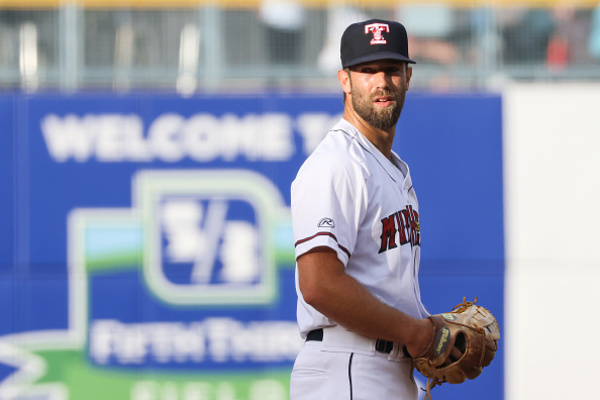


Toledo Mud Hens starting pitcher Daniel Norris looks for the sign during the second inning of a Triple-A Minor League Baseball regular season game between the Indianapolis Indians and the Toledo Mud Hens on July 28, 2022 at Fifth Third Field in Toledo, Ohio. (Photo by Scott W. Grau/Icon Sportswire via Getty Images)
Ask anyone who has played minor league baseball (or at least, those who didn’t get a huge signing bonus before playing minor league baseball) and they’ll tell you that the pay raises players in affiliated baseball will receive this year are long overdue.
For years, the players who toiled in relative obscurity while providing nightly entertainment to the citizens of far-flung towns across the U.S. and Canada while chasing their baseball dreams earned what could barely be called a living wage. This year, minor leaguers will get a significant pay hike after unionizing under the Major League Baseball Players Association and reaching a collective bargaining agreement with Major League Baseball, pending a vote by the owners to approve the CBA, which is expected to come March 31.
Previously, the minor leagues were not unionized. All player payroll in affiliated minor league baseball is handled by Major League Baseball clubs, who contract with the owners of local franchises to provide the on-field personnel for each team.
It’s hard to believe, but the minimum salary for players in Triple-A last season was $17,500 – and that was the highest minimum salary in the minor leagues. You’d make more money working full time for minimum wage at McDonald’s for a year than playing a full season a whisker away from the pinnacle of professional baseball. And the lower in the minors you go, the worse the pay: Players in Class A were making $11,000 on the low end, while complex league and rookie ball players pulled in a minimum salary of $4,800. Those were the minimum salaries, and sure, there were players who made more than that amount. In addition to salary, players are given meal money, most of which goes to the clubhouse manager to provide a “spread” of food after the game and as a tip for doing the laundry and other services.
For players in the full-season leagues – Low-A, High-A, Double-A, and Triple-A – the season lasts 140 games. Assuming those players work eight hours a day on game days (Ha! They work a lot longer than that most game days), they’d work 1,120 hours per season. Last year, that worked out to $15.63 per hour for players in Triple-A and $9.82 per hour for players in Class A.
But for 2023, the minimum salaries in the minor leagues will go up to $19,800 in complex and rookie leagues, $26,200 in Class A, $27,300 in High-A, $30,250 in Double-A, and $35,800 in Triple-A.
This year, the hourly pay looks quite a bit better: Triple-A players will earn $31.96 per hour based on 140 eight-hour work days during the season, and players in the complex leagues and rookie ball will make $17.67 based on the same hours – more than Triple-A players earned last year, and more than the minimum wage in every state in the country.
There’s a misperception that players are living their dream, and the low salaries are part of that – as if “living your dream” somehow makes it ok for the company that employs you (let’s not forget that yes, baseball players are employees) to pay you peanuts, because living your childhood dreams is somehow payment enough.
No one – not now, not ever – got rich playing in the minor leagues, and there’s always been a feeling of shared sacrifice and “embracing the suck” in minor league sports – I would know, I worked as a broadcaster and public relations director for two different ECHL hockey teams about 15 years ago. Teammates and staff bond over the long bus rides, bad hotels and awful food, all hoping that a few seasons down the road, they’ll be working on a Saturday night in New York instead of, say, Wednesday night in Wheeling, West Virginia.
Starting this year, at least the boys of summer will have a little more to show for their labor of love. It’s still not much, but at least it’s a living.